Former EA Communications Manager Says Backlash To NFTs In Gaming Is Just An Example Of How “Gamers Love Hating Things Together,” Compares It To How Gamers Hate EA But Spend Thousands on FIFA
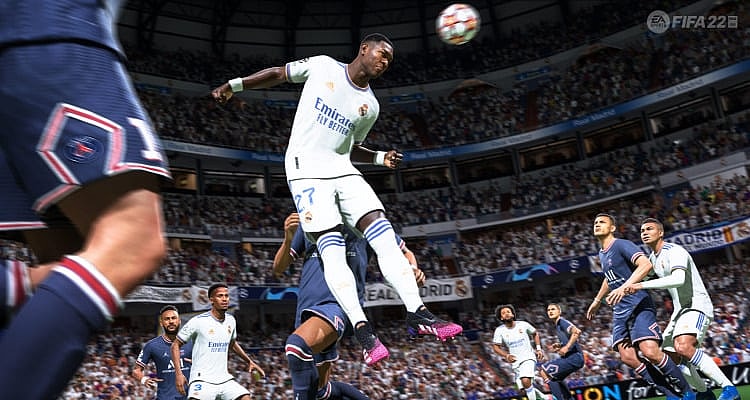
A former EA Communications manager believes that the widespread backlash to the implementation of NFTs in gaming is nothing more than an example of how “gamers love hating things together” similar to how players hate EA but continue to spend thousands on FIFA microtransactions.
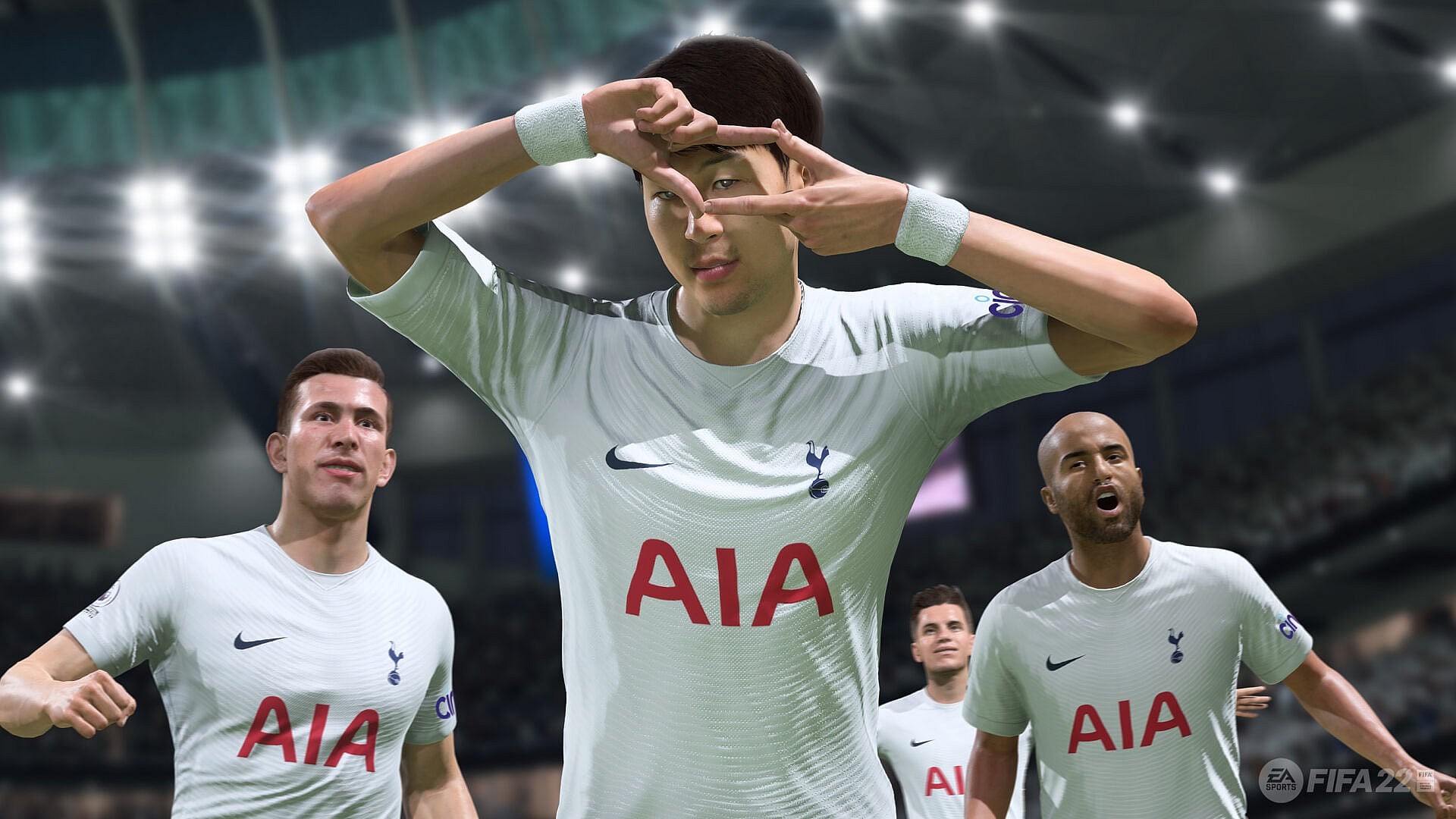
For those unfamiliar, NFTS, or Non-Fungible Tokens, are a form of ownership data. These digital tokens utilize a blockchain system to verify ownership of a photo, video, or more.
However, the purchase of NFTs doesn’t confer any ownership of a physical or even digital item to its owner.
As explained by NFT co-creator Anil Dash to The Atlantic, most blockchains are too small to hold the data of an entire image. As such, those buying NFTs are not buying the actual digital image, but rather the rights to a hyperlink URL which an image held on an outside server.

Even Dash admits that in many cases, the NFT in question may be part of a start-up that fails within a few years. “Decades from now,” Dash proposes, “how will anyone verify whether the linked artwork is the original?”
Along with concerns of ownership rights, such as what protections are offered to stop somenoe from simply downloading their own copy of a given image, NFTs have been scrutinized for their high carbon footprints and their frequent use in scams [1, 2].

RELATED: Batman Artist Neal Adams Puts Several Pieces Of His Comic Book Art Up For Auction As NFTs
Nonetheless, many gaming companies, hoping to sell ownership of digital items and get a slice of the pie when those fans sell NFTs among themselves, have begun to push this new technology.
Companies known to have shown an interest in NFTs include Take-Two Interactive, Zynga, Sega, and Square Enix – all to the chagrin of their fans.
GSC Game World has cancelled all NFT-related content for S.T.A.L.K.E.R. 2: Heart of Chernobyl, a mere 24 hours after they were announced due to backlash.
Meanwhile, Ubisoft’s venture into NFTs with the beta launch of “Quartz” has made a mere $700 just over a week after launch.
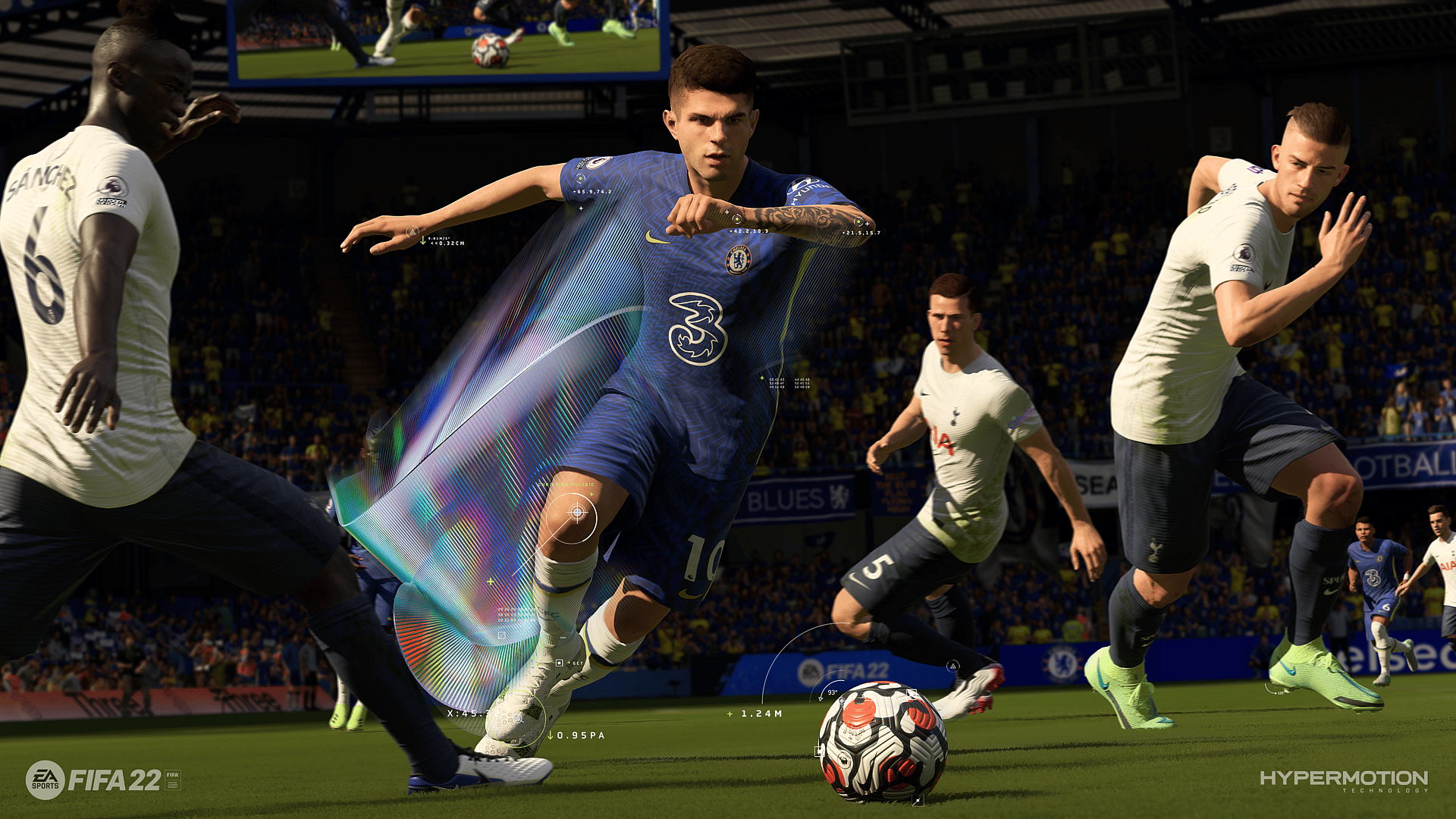
Another company charging into the opportunities NFTs promise is EA, fresh off their disastrous implementation of loot boxes in Star Wars Battlefront II which caused governments of the world to begin debating whether the digital items constitute gambling (EA representatives told the UK House of Commons parliament that loot boxes are actually “surprise mechanics,” a defense balked by the Chair).
In their November 2021 Q2 investor call, EA CEO Andrew Wilson proposed that NFTs could be used to give fans more ways be more involved with FIFA.
“They want more digital experiences outside the game, esports, NFTs broader sports consumption and they want us to move really, really quickly,” he said. “I do think it will be an important part of our — of the future of our industry on a go-forward basis.”
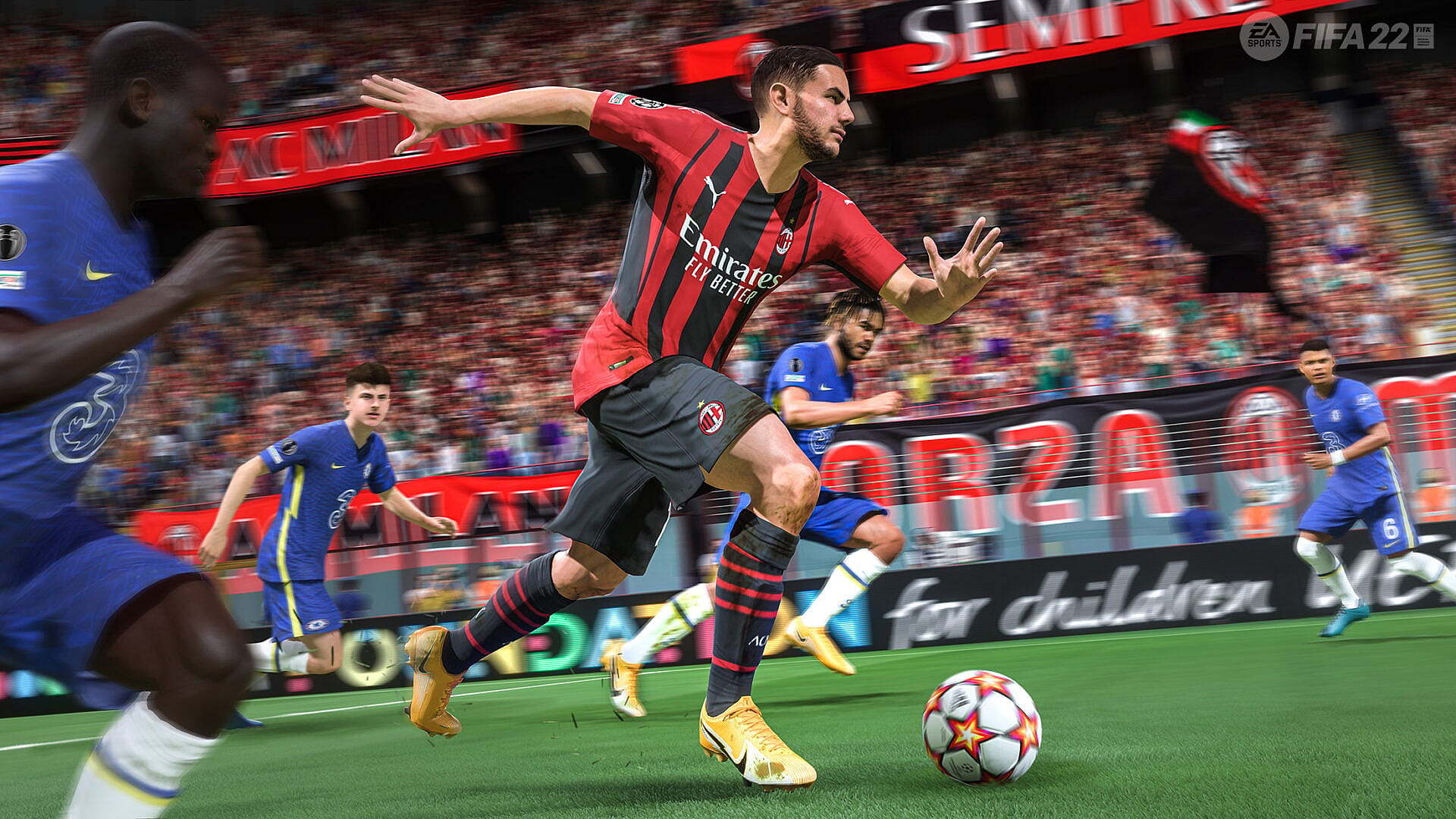
RELATED: Dutch Football Legend Marco van Basten Removed from FIFA 20 Over Off-Camera “Sieg Heil” Joke
Now the debate over gaming NFTs has gotten red hot, thanks to the opinion of Chukwuma Morah, a former EA Communications Specialist and current eSports host better known as ChuBoi.
Morah shared his thoughts on NFTs in gaming in response to a Twitter thread posted by Cryptocurrency podcaster Jordan “Cobie” Fish discussing how he had upset gamers for claiming NFTs were in their self-interest.
“The outrage from gavers over the inclusion of NFTs is an astronomical unwitting vote against self-interests,” declared Cobie on January 1st. “If gaming cos are able to build more sustainable revenue models without paywall DLC, NFTs can improve player experience even if you opt out of buying them yourself.”
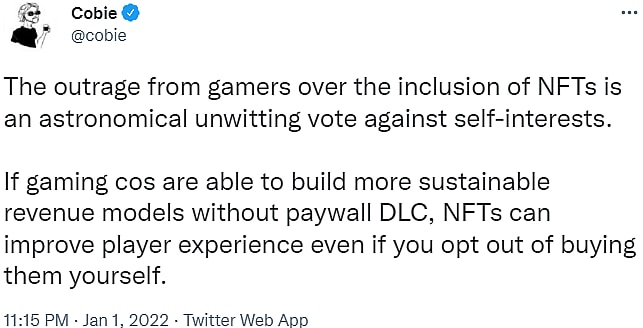
Cobie then proposed that as gamers spent so much time playing games, “Why would a gamer not want to own their own in-game progress and achievements? It seems only beneficial for users to own those items personally, instead of the gaming company retaining ownership.”
In addition, Cobie further argued that industry-wide adoption of NFTs would remove the use of paywall-style DLC, as he speculated that players would be “given ownership and retaining some $ value of your in-game engagement.”
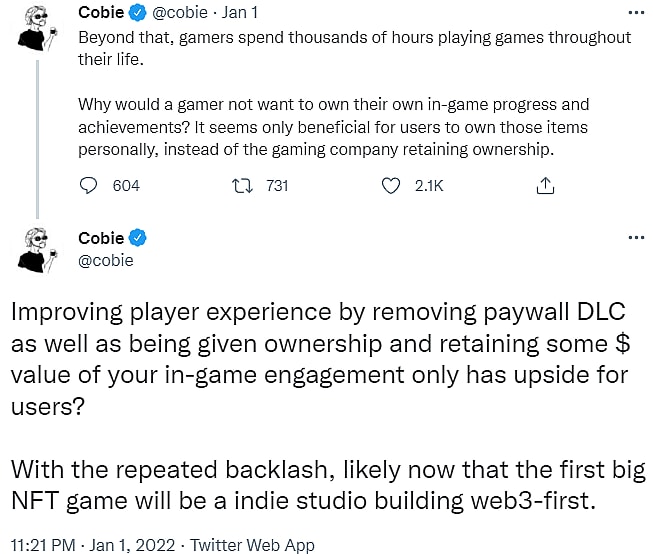
Gamers were quick to denounce the proposal as flawed, with the consensus seeming to be that companies would likely treat NFTs as yet another way to gouge money from players and use them as a “get-rich-quick”, for-profiut schem rather than as any sort of gameplay element.
Thus, the game would be a vehicle for the NFTs and those hoping to “invest,” rather than a piece of entertainment for gamers first and foremost.
“Gamer twitter is not happy with me,” Cobie tweeted the next day, “seems a lot of them have stockholm syndrome and only imagine worst case scenarios from potential or implied change. The economic interests of the biggest studios are obviously extractive and misaligned with players.”

This is when ChuBoi chimed in to agree with Cobie, sharing some insight into his March 2012-October 2015 tenure at EA .
“True. I worked at EA on FIFA as Comm Mgr. Gamers love hating things together. Even when it makes 0 sense. Makes them feel part of s’thing [something],” said ChuBoi. “Ex: We ‘hate’ EA but spend thousands on our FIFA accts that reset every yr.”
ChuBoi next admitted that those he explained NFTs to said it sounded like a scam before presenting three proposals he believed could help make gamers accepting of NFTs.
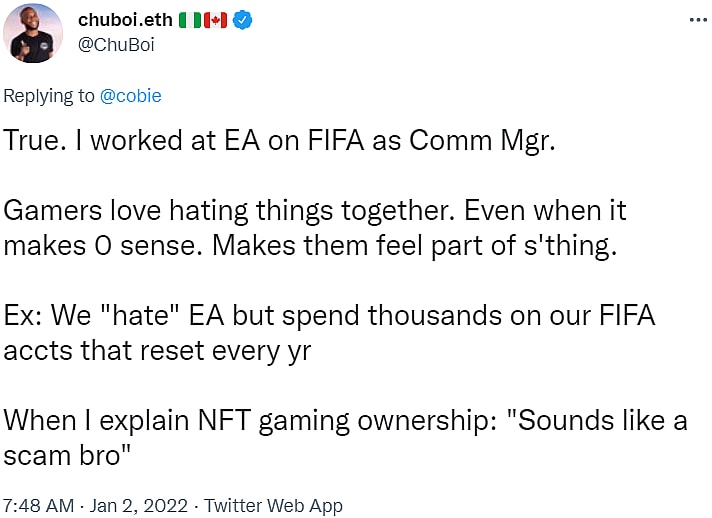
These included “Gaming NFTs renamed to s’thing like ‘Digital Ownership’ to shake FUD,” “Mid-to-large gaming influencers making $$$ playing an NFT game to prove it’s legit,” and “A non-AAA studio making THAT huge web3 game that flips the script since gamers ‘hate’ big studios.”
It should be noted that ChuBoi lists his current occupation as ESports Host & Video Game Influencer on LinkedIn, and on Twitter notes that he is the founder of idolo Cards & NFTs.

While discussion around ChuBoi’s tweet showed some support for NFTs, others were still adamant that the tokens would fail to improve the game.
For example, @ToeKnee_G was adamant that “scammers love scamming others together too,” telling ChuBoi, “the more scammers promoting their scams together, the more they feel part of s’thing, even when it makes 0 sense.”
“No one has come up with a legit reason NFT makes gaming better, other than s’one profiting off of digital goods,” he added. “Gameplay?”
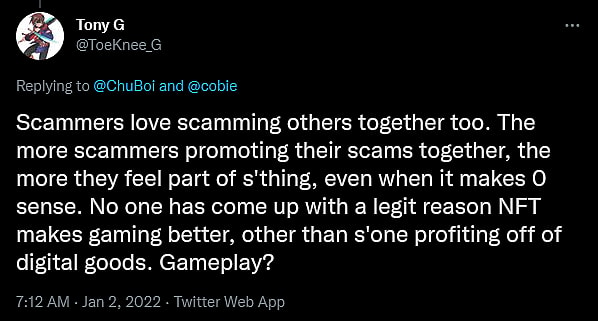
Another user, @Chxrlie96 further claimed that the only reason players continued to spend money on FIFA was “because packs in your games are basically a form of predatory gambling.”
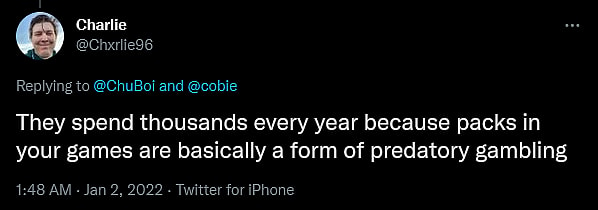
Though ChuBoi soon disengaged with the topic, Cobie later surmised gamers didn’t know why they were angry about NFTs, dismissively claiming that gamers’ rejection of the concept was simply because they “don’t appear to -want- to learn“.
Cobie then added “They seem to not like a lot of stuff,” before providing a list of given arguments against NFTs which included “it burns the rainforest’, its just a pointer to an image, not an image, big studios will use it to make their games even worse, nfts cost $500,000 how can gamers afford that, they are for money laundering, [and] speculators reduce fun”.
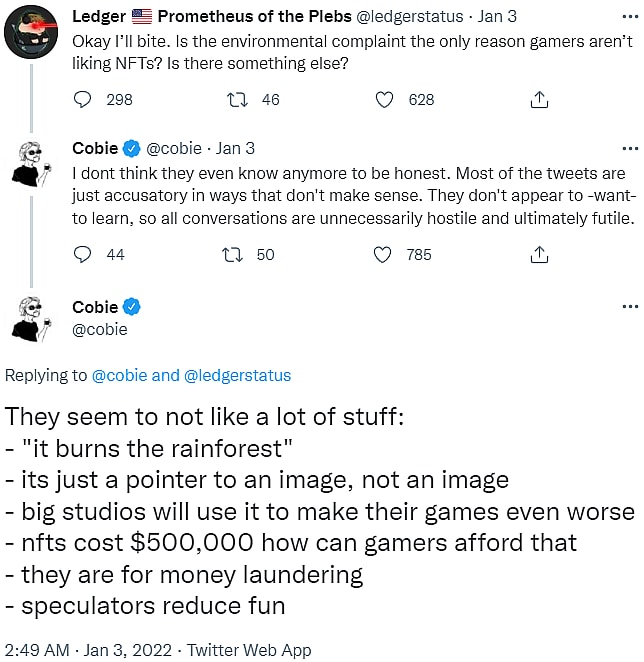
Even so, Cobie ultimately showed some sympathy, comparing gamers’ distrust of larger gaming companies to the same sentiment shared by Bitcoin miners who didn’t trust PayPal or major banks.
“They think they’re capitalistic profiteering anti-player corps that mistreat employees and only care about PnL,” he asserted.

“So, if you think that,” Cobie admitted, “and you see the stupidity and exuberance in NFT markets (1m for a picture of an ugly monkey) then it makes sense that you’d conclude these s–tbag companies are gonna f–k up the game by integrating the f—–g stupidest speculative stuff ever.”
He continued, “And I can sympathise with that a lot. They’ve been lootboxxed and microtransacted to death already, and now they see that these multimillionaire bubble ponzis are going to be put in their game. Of course they think the worst, they hate the studio and the NFTs.”
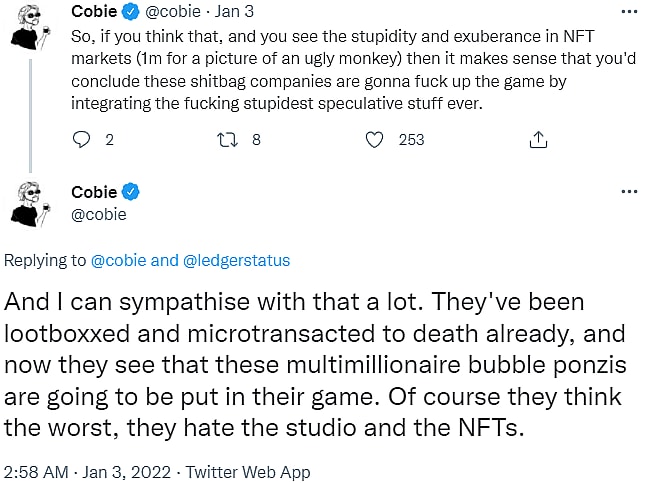
However, Cobie then seemingly went right back to blaming gamers for failing to see the light. ”
But funny that in non-gaming world, people said ‘hey, owners should become more involved in operating, fuck the big bank/corp/whatever, we decide’ and in gaming they have an opposite reaction,” he wrote. “I think at the end of the day, they have hard lives like everyone else does.”
Yet, Cobie did relent that “Inequality is increasing & it feels like the world is getting worse sometimes. And [gamers] play games as an escape from that grind, to stop thinking about the real world. Financialisation might break that immersion quite a lot, which might threaten to ruin their one reliable escape.”
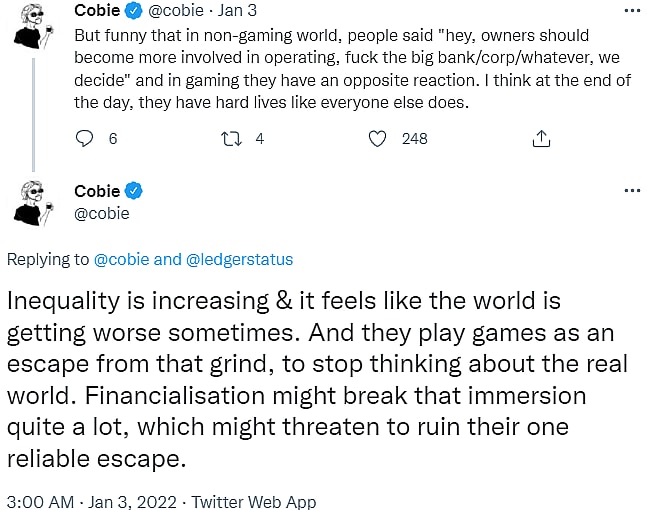
Ultimately, the podcaster concluded his thoughts with an expression of sympathy towards gamers, stating, “I can be sympathetic to people that think the worst case scenario is going to become reality after big studios constantly taught them that they will make games worse for profit. They’re scared of losing their escape from reality.”
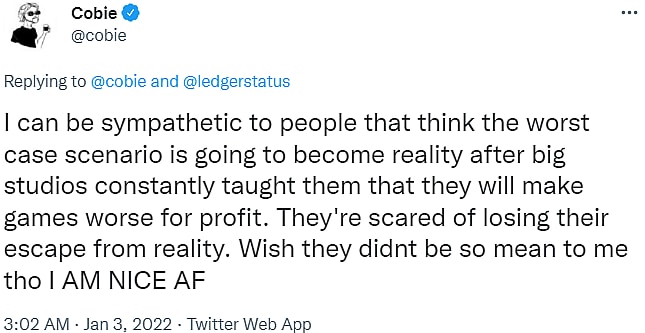
What do you think of Cobie and ChuBoi’s comments? Can major gaming companies be trusted to implement NFTs in a way that actually improves gaming? Let us know what you think on social media, and in the comments below.
NEXT: Ubisoft Quartz NFTs Have Made Less Than $700 USD Across 18 Sales Since Launch
